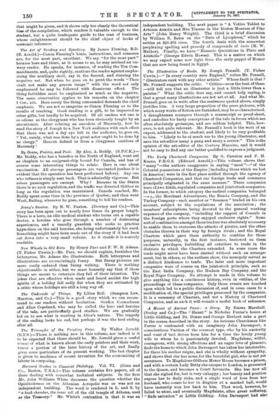The Early Chartered Companies. By G. Cawston and F. H.
Keane, F.R.G.S. (Edward Arnold.)—This volume shows that "many "—the authors exaggerate in saying " most "—" of the Colonial possessions of the Empire [including those which we lost in America] were in the first place settled through the agency of Chartered Companies, and that our foreign trade and commerce principally originated in the same manner." These companies were cfitwo kinds, regulated companies and joint-stock companies. In the former, to which category the earliest companies belonged —e g., the Merchant Adventurers, the Russia Company, and the Turkey Company—each member or " freeman " traded on his own account, subject to the regulations of the association ; the members' subscriptions being devoted to the general working expenses of the company, "including the support of Consuls in the foreign ports where they enjoyed exclusive rights." Some sort of combination amongst these traders was absolutely necessary to enable them to overcome the attacks of pirates, and the other obstacles thrown in their way by foreign rivals ; and the Royal Charters which gave them authority to combine for these purposes, naturally, in the first instance, bestowed on them exclusive privileges, forbidding all outsiders to trade in the districts to which the Charters extended. In some cases the trade might never have been started without such an arrange- ment, but in others, as the authors show, the monopoly served as a distinct hindrance to trade. The later and more important companies were of course on the joint-stock principle, such as the East India Company, the Hudson Bay Company, and the Royal Niger Company. No attempt is made in this volume to give anything like a continuous history, even in outline, of the proceedings of these companies. Only those events are touched upon which led to a public discussion of, and in some cases to a modification of, the special privileges possessed by the companies. It is a summary of Charters, and not a History of Chartered Companies, and as such it will remain a useful book of reference.


















































 Previous page
Previous page